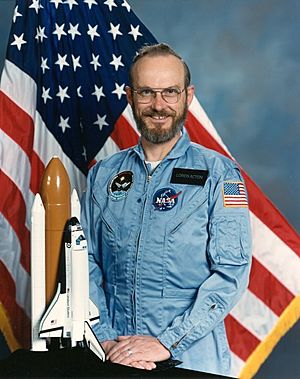Loren Acton facts for kids
Quick facts for kids
Loren Wilber Acton
|
|
|---|---|
 |
|
| Born | 7 March 1936 |
| Status | Retired |
| Alma mater | Montana State University, (BS) University of Colorado, Boulder, (PhD) |
| Occupation | Solar X-ray Physicist |
| Space career | |
| Lockheed Payload Specialist | |
|
Time in space
|
7d 22h 45min |
| Missions | STS-51-F |
|
Mission insignia
|
|
Loren Wilber Acton was born on March 7, 1936. He is an American scientist who became an astronaut. He flew into space on the Space Shuttle mission STS-51-F. On this mission, he worked as a Payload Specialist for a company called Lockheed. A Payload Specialist is a scientist or engineer who goes into space to operate specific experiments or equipment. Loren Acton is also the father of Cheryll Glotfelty, who is a leading expert in a field called ecocriticism, which studies how literature and the environment are connected.
Contents
Early Life and Education
Loren Acton was born in Lewistown, Montana. He loved learning about science from a young age.
College and Advanced Degrees
He went to Montana State University. In 1959, he earned a Bachelor of Science degree in Engineering Physics. This degree taught him about how physics and engineering work together. Later, in 1965, he earned a Doctor of Philosophy (PhD) degree in astrophysics from the University of Colorado at Boulder. Astrophysics is the study of stars, planets, and the universe.
Career as a Scientist and Astronaut
Before becoming an astronaut, Loren Acton was a senior scientist. He worked at the Space Sciences Laboratory in California. His main job was to study the Sun and other objects in space. He used special instruments designed for space missions.
Spacelab 2 Mission
Loren Acton was chosen as one of four Payload Specialists for a mission called Spacelab 2. This happened on August 9, 1978. He trained for seven years to prepare for his space flight. In 1985, he finally flew on the STS-51-F mission, which carried the Spacelab-2 module.
During this mission, Acton traveled more than 2.8 million miles. He orbited the Earth 126 times. He spent over 190 hours, which is more than seven days, in space.
Life After Space Flight
After his space mission, Loren Acton continued his scientific work. He is now a retired Research Professor of Physics at Montana State University. There, he helped start the Solar Physics group. This group studies the Sun and its behavior. They also created the Space Science and Engineering Laboratory.
The solar group at Montana State University still does important research. They work with organizations like NASA and the National Science Foundation. They help operate and use satellite missions to study the Sun every day.
Studying the Sun's X-rays
Loren Acton was a main scientist for an experiment called the Soft X-ray Telescope (SXT). This telescope was part of the Yohkoh mission. The Yohkoh mission was a joint project between Japan, the United States, and the United Kingdom. It focused on studying high-energy events on the Sun. These events include solar flares and eruptions. It also studied how the Sun's outer atmosphere, called the corona, gets very hot.
The Sun's corona is extremely hot. It mainly gives off X-rays. The Yohkoh mission provided long-duration, high-resolution X-ray images. These images helped scientists understand why the Sun has a corona. They also helped explain why its brightness changes so much during the 11-year sunspot cycle.
Awards and Recognition
Loren Acton has received several important awards for his work.
- In 2000, he received the George Ellery Hale Prize. This award is given by the Solar Physics Division of the American Astronomical Society.
- In February 2020, he was recognized as a Legacy Fellow of the American Astronomical Society.
- In 2017, the Japanese government honored him with The Order of the Rising Sun, Gold Rays with Neck Ribbon. This is a very high award from Japan.
 | Jackie Robinson |
 | Jack Johnson |
 | Althea Gibson |
 | Arthur Ashe |
 | Muhammad Ali |

